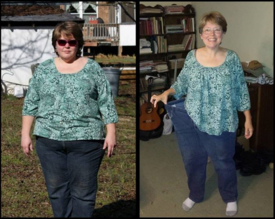Do you measure food by weight or volume?

jeep725
Posts: 4 Member
I have a food scale and I find it more convenient to measure foods out by weight than getting out extra measuring cups/spoons to add ingredients.
However, I'm finding if I compare the info to what is listed on cartons, they don't usually match up. For example, the label on my cottage cheese carton says a serving size = 1/2 cup (113g)
So I've been weighing out 113 g for a serving size. I then measured out a 1/2 cup to compare, and it actually weighed 126 g.
So I'm curious, which is more accurate to the listed calories? I'm not even sure how I could go about finding out.
However, I'm finding if I compare the info to what is listed on cartons, they don't usually match up. For example, the label on my cottage cheese carton says a serving size = 1/2 cup (113g)
So I've been weighing out 113 g for a serving size. I then measured out a 1/2 cup to compare, and it actually weighed 126 g.
So I'm curious, which is more accurate to the listed calories? I'm not even sure how I could go about finding out.
0
Replies
-
food scale for solids
measuring spoons and measuring cup for liquids only1 -
Weight, always weight.2
-
socioseguro wrote: »food scale for solids
measuring spoons and measuring cup for liquids only
This.0 -
Always weigh. My food scale has ml measurements as well for liquids.0
-
weighing is more accurate
0 -
So I'm curious, which is more accurate to the listed calories?
The calorie counts on the food nutrition label are tied to the weight of the product, usually in grams (although ounces might be listed for reference), unless it is a liquid, in which case the nutrition data is tied to the volume of the product in ml (or fluid ounces for reference).
1 -
foxygirl14 wrote: »Always weigh. My food scale has ml measurements as well for liquids.
Most scales with this setting are based on the weight of a ML of water, and different liquids are going to give you slightly different results. Volume is usually more accurate for liquid, but most of the time it's not that big of a deal.1 -
Depends on what I am weighing but I tend to use my food scale for most everything. I always do meats and anything like tuna or fish on the scale. I do liquids in a measuring spoon/cup and sometimes I weigh veggies in a cup but usually I just sit my plate on the scale and then put the amount I want on the plate and measure it that way.0
-
The only think I measure by cup is almond milk.0
-
Your example explains perfectly why you should always weigh.
You weighed and logged the calories of 113g. If you had measured, you would have logged 113g but really eaten 126g worth of calories.1 -
However, I'm finding if I compare the info to what is listed on cartons, they don't usually match up. For example, the label on my cottage cheese carton says a serving size = 1/2 cup (113g)
This is EXACTLY why people say to use a food scale. If you're using measuring cups you're not eating what you think you are.2 -
Weigh. My salsa goes into my fajita in a measuring tablespoon. Weighing the contents of the spoon and using convertunits.com to convert from grams to tablespoons usually shows that a tablespoon has 1.4 tblsp of salsa in it.0
-
Weigh it!0
-
I wonder about the same thing, but prefer to weigh for convenience. I zero the container and zero again after each food ingredient added. I think weight and volume of water is identical.0
-
weight0
This discussion has been closed.
Categories
- All Categories
- 1.4M Health, Wellness and Goals
- 395.9K Introduce Yourself
- 44.1K Getting Started
- 260.7K Health and Weight Loss
- 176.3K Food and Nutrition
- 47.6K Recipes
- 232.8K Fitness and Exercise
- 448 Sleep, Mindfulness and Overall Wellness
- 6.5K Goal: Maintaining Weight
- 8.6K Goal: Gaining Weight and Body Building
- 153.3K Motivation and Support
- 8.2K Challenges
- 1.3K Debate Club
- 96.4K Chit-Chat
- 2.5K Fun and Games
- 4.4K MyFitnessPal Information
- 16 News and Announcements
- 18 MyFitnessPal Academy
- 1.4K Feature Suggestions and Ideas
- 3K MyFitnessPal Tech Support Questions














